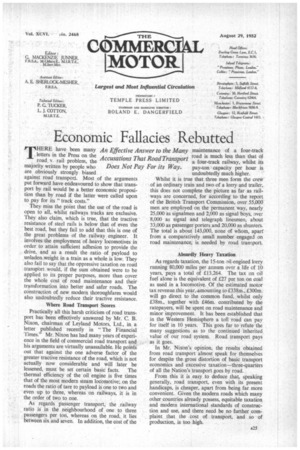Economic Fallacies Rebutted
Page 27

If you've noticed an error in this article please click here to report it so we can fix it.
THERE have been many An Effective Answer to the Many letters in the Press on the road. v. rail problem, the Accusations That Road Transport majority written by people who Does Not Pay For its Way. are obviously strongly biased against road transport. Most of the arguments put forward have endeavoured to show that transport by rail would be a better economic proposition than by road if the latter were called upon to pay for its "track costs."
They miss the point that the use of the road is open to all, whilst railways tracks are exclusive. They also claim, which is true, that the tractive resistance of steel rails is below that of even the best road, but they fail to add that this is one of the great problems of the railway engineer. It involves the employment of heavy locomotives in order to attain sufficient adhesion to provide the drive, and as a result the ratio of payload to unladen weight in a train as a whole is low. They also fail to say that the oppressive taxation on road transport would, if the sum obtained were to be applied to its proper purposes, more than cover the whole cost of road maintenance and their transformation into better and safer roads. The construction of new modern thoroughfares would also undoubtedly reduce their tractive resistance.
Where Road Transport Scores Practically all this harsh criticism of road transport has been effectively answered by Mr. C. B. Nixon, chairman of Leyland Motors, Ltd., in a letter published recently in "The Financial Times." Mr. Nixon has had many years of experience in the field of commercial road transport and his arguments are virtually unassailable. He point's out that against the one adverse factor, of the greater tractive resistance of the road, which is not actually now considerable and will later be lessened, .must be set certain basic facts. The thermal efficiency of the oil engine is five times that of the most modern steam locomotive; on the roads the ratio of tare to payload is one to two and even up to three, whereas on railways, it is in the order of two to one.
As regards passenger transport, the railway ratio is in the neighbourhood of one to three passengers per ton, whereas on the road,. it lies between six and seven. In addition, the cost of the maintenance of a four-track road is much less than that of a four-track railway, whilst its pay-ton capacity per hour is undoubtedly much higher.
Whilst it is true that three men form the crew of an ordinary train and two of a lorry and trailer, this does not complete the picture as far as railways are concerned, for according to the report of the British Transport Commission, over 55,000 men are employed on the permanent way, nearly 25,000 as signalmen and 2,000 as signal boys, over 8,000 as signal and telegraph linesmen, about 33,000 as passenger porters and 20,000 as shunters. The total is about 143,000, none of whom, apart' from a comparatively small number engaged on road maintenance, is needed by road tratrport.
Absurdly Heavy Taxation As regards taxation, the 15-ton oil .engined lorry running 80,000 miles per annum over a life of 10 years, pays a total of £13,264. The tax on oil fuel alone is the equivalent of £27 per ton on coal as used in a locomotive. Of the estimated motor tax revenue this yearoamounting to£338m., £300m. will go direct to the common fund, whilst only £38m., together with £46m. contributed by the ratepayers, will be spent on road maintenance and minor improvement. It has been established that in the Western Hemisphere a toll road can pay for itself in 10 years. This goes far to refute the many suggestions as to the continued inherited value of our road system. Road transport pays as it goes.
In Mr. Nixon's opinion, the results obtained from road transport almost speak for themselves for despite the gross distortion of basic transport economics and excessive taxation—three-quarters of all the Nation's transport goes by road.
From this it is easy to deduce that, speaking generally, road transport, even with its present handicaps, is cheaper, apart from being far more convenient. Given the modern roads which many other countries already possess, equitable taxation and modern international standards of construction and use, and there need be no further complaint that the cost of transport, and so of production, is too high.




















































































